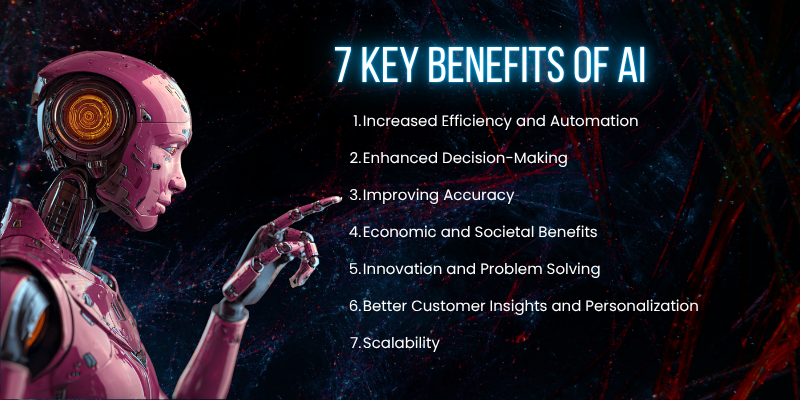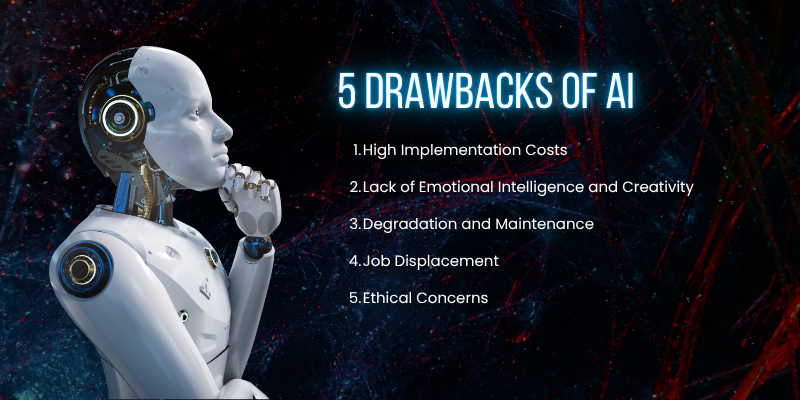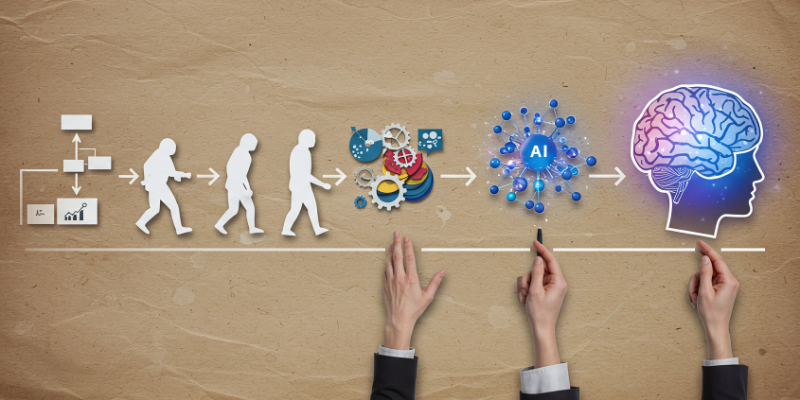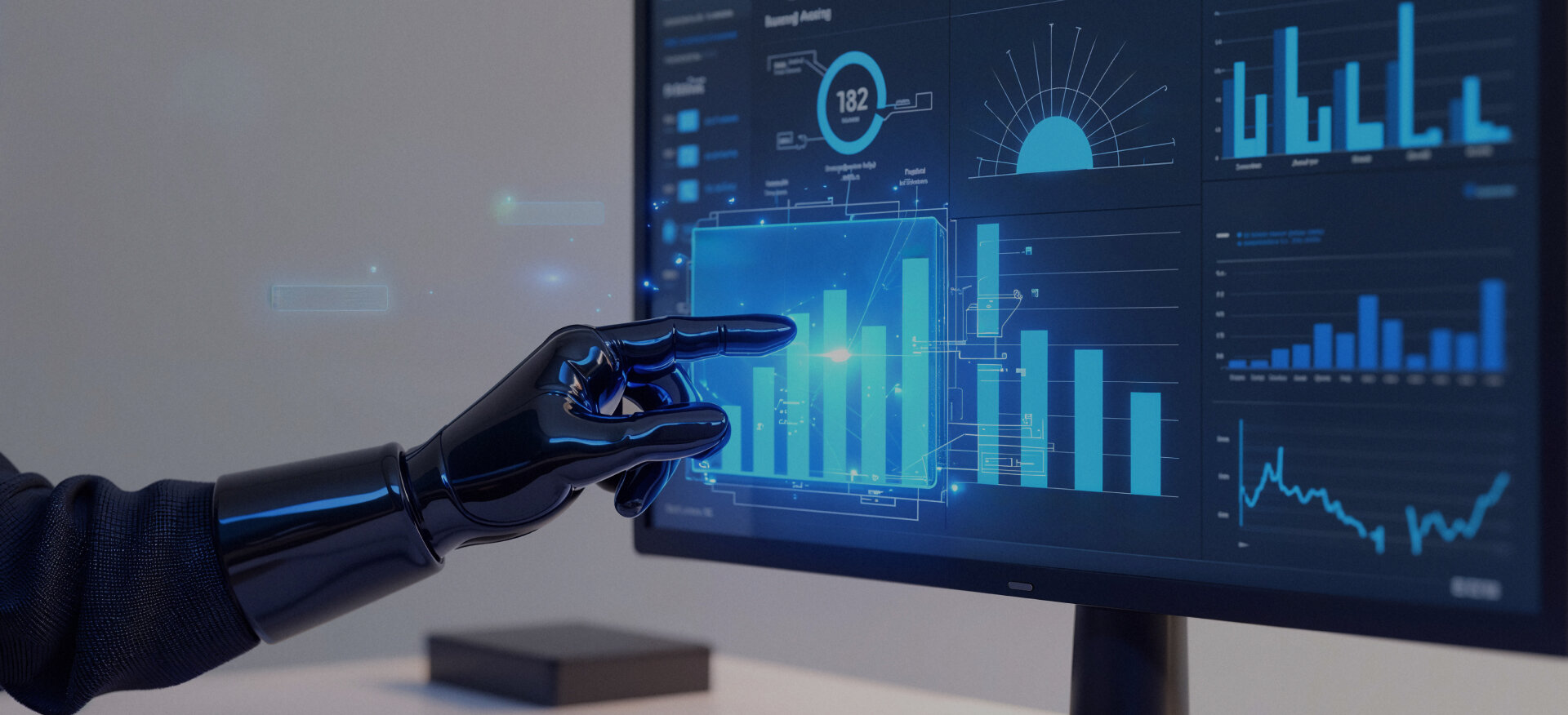Why is AI Good? Artificial Intelligence (AI) offers transformative benefits across various sectors, enhancing efficiency, decision-making, and personalization.
However, AI vs human capabilities highlight that while AI excels in automating tasks, humans bring creativity and emotional intelligence to the table.
Its ability to process vast amounts of data rapidly and accurately enables organizations to make informed decisions and automate complex tasks.
AI is projected to contribute approximately $15.7 trillion to the global GDP by 2030, driven by productivity gains and increased consumption.
One of the primary advantages of AI is its capacity to automate repetitive and time-consuming tasks, leading to significant improvements in productivity and cost reduction.
For instance, AI systems can handle data entry, scheduling, and customer service inquiries, allowing human employees to focus on more strategic activities.
While AI may displace certain jobs, it is also expected to create 69 million new roles worldwide by 2028, particularly in AI and machine learning fields.
In this article, we’ll discuss the major benefits and drawbacks of adopting AI in business.
What Is Artificial Intelligence (AI)?
Artificial Intelligence (AI) is the branch of computer science focused on creating machines and software capable of performing tasks that typically require human intelligence.
AI vs Machine Learning is a crucial distinction here, where machine learning is a subset that allows AI systems to learn from data.
These tasks include learning from experience (machine learning), reasoning, problem-solving, understanding language, recognizing images and speech, and making decisions.
Key components of AI are:
- Machine Learning (ML): Algorithms that enable computers to learn from data and improve performance without explicit programming.
- Deep Learning: A subset of ML that uses artificial neural networks inspired by the human brain to process complex data like images, video, and speech.
- Natural Language Processing (NLP): Enables machines to understand, interpret, and respond to human language (e.g., chatbots, language translators).
- Computer Vision: Allows computers to interpret and process visual data from the world, such as identifying objects in images or videos.
- Robotics: Combines AI with mechanical engineering to create intelligent machines that can perform physical tasks autonomously.
AI is transforming industries by making processes faster, more efficient, and data-driven. It’s behind innovations like autonomous vehicles, virtual assistants, personalized medicine, and smart cities, and continues to shape the future of how we live and work.
7 Key Benefits of AI for Business
Artificial Intelligence (AI) has become a cornerstone for businesses aiming to stay competitive in today's fast-paced market. AI offers numerous benefits that can transform various aspects of business operations.

Here are 5 key benefits of AI for businesses:
1. Increased Efficiency and Automation
AI can handle repetitive, mundane tasks, freeing up human resources for more complex and creative tasks. This is where companies often look into AI automation agencies to streamline their workflows and enhance their productivity. Automation of workflows, data entry, inventory management, and customer interactions leads to improved efficiency and cost savings, making operations more streamlined.
2. Enhanced Decision-Making
AI-driven tools can process vast amounts of data and provide actionable insights in real-time. Businesses can leverage these insights to make more informed, data-backed decisions, whether it’s forecasting demand, analyzing market trends, or optimizing pricing strategies.
3. Improving Accuracy
AI algorithms reduce human error by providing highly accurate data analysis. From predicting customer behavior to financial forecasting, AI can help businesses make more reliable decisions, leading to fewer mistakes and better overall performance.
4. Economical and Societal Benefits
AI can significantly reduce operational costs by automating time-consuming tasks and improving productivity. Additionally, AI's ability to predict trends and optimize processes can lead to resource conservation, helping companies contribute to sustainability efforts and positively impact society.
5. Innovation and Problem Solving
AI facilitates innovation by enabling businesses to identify new opportunities and solve complex problems. AI in B2B sales has proven particularly effective by helping companies generate leads and tailor personalized marketing campaigns. Whether through product development, market analysis, or enhancing customer experiences, AI opens up avenues for creative solutions and groundbreaking innovations.
6. Better Customer Insights and Personalization
AI can help businesses better understand their customers by analyzing behavior patterns, preferences, and feedback. By using the best AI SEO software, businesses can optimize their digital presence and improve search rankings based on customer insights. This allows businesses to deliver personalized experiences, product recommendations, and targeted marketing strategies, ultimately driving customer satisfaction and loyalty.
7. Scalability
AI systems enable businesses to scale operations efficiently by managing larger volumes of data, automating processes, and optimizing workflows. As companies grow, AI-powered tools can handle increased demand without the need for significant additional resources, allowing businesses to expand smoothly.
By embracing AI, businesses can boost efficiency, make data-driven decisions, and remain agile in an ever-changing market. These benefits make AI an essential tool for any organization aiming to thrive in the digital age.
Also Read: How Do AI Detectors Work
Explore Our Web Design & Development Services!
5 Drawbacks of Artificial Intelligence
While the advantages of AI are significant, it’s essential for businesses to also consider the potential disadvantages before fully embracing this technology.

One challenge in software development is ensuring that AI systems are regularly updated to address issues such as bias and outdated information. Implementing AI can come with various challenges, from high costs to ethical concerns.
Here are some of the main drawbacks to keep in mind:
1. High Implementation Costs
The cost of implementing AI can be substantial, especially for small to medium-sized businesses. Developing and deploying an AI solution may range from $20,000 to millions of dollars, depending on the scope and complexity of the AI system. Although AI can drive efficiency and reduce costs in the long run, the initial investment can be a barrier for many companies.
2. Lack of Emotional Intelligence and Creativity
AI excels in processing data and following programmed instructions, but it lacks the ability to make decisions based on emotion or creativity. While AI can generate novel ideas based on data, it cannot come up with truly original or inventive solutions. For tasks requiring empathy, creative problem-solving, or artistic endeavors, humans remain far superior.
Additionally, AI can fail to comprehend the emotional implications of its decisions. For example, AI algorithms used in sensitive areas, such as hiring or lending, can unintentionally perpetuate bias due to a lack of emotional understanding, leading to ethical concerns and discrimination.
3. Degradation and Maintenance
Just like any other technology, AI systems are subject to degradation over time. The hardware used to run AI applications may wear out, and the models themselves can become outdated without regular updates and maintenance. Without continuous retraining by human experts, AI can lose its effectiveness, becoming less accurate and less efficient as it encounters new data that it wasn't trained to handle.
4. Job Displacement
As AI takes over routine and repetitive tasks, it can lead to job displacement. Many jobs, particularly those involving manual labor or administrative work, could be automated, resulting in job loss for certain workers. While AI might create new job opportunities, it also raises the challenge of reskilling the workforce and addressing the social impact of such transitions.
5. Ethical Concerns
The widespread use of AI raises a host of ethical issues, particularly related to privacy and data security. AI systems often rely on vast amounts of personal data to function, and there are growing concerns about how this data is collected, stored, and used. The ability of AI to analyze and predict behaviors without direct consent poses significant risks to consumer privacy.
Additionally, ethical concerns extend to issues like legal accountability, especially when AI systems make decisions that impact individuals or society.
By understanding these drawbacks, businesses can approach AI adoption more thoughtfully, weighing the risks and challenges alongside the potential rewards.
Why Should You Care About AI?
AI is a driving force behind the next wave of innovation. From self-driving cars to smart assistants and healthcare breakthroughs, Centric, a leading digital transformation agency, helps businesses navigate these advancements with tailor-made solutions. Whether through digital marketing services or creative services, AI plays a critical role in enhancing productivity and customer engagement.

Businesses that adopt AI today will be better positioned for the future, driving growth and staying ahead of competitors.
Whether it's chatbots handling customer service inquiries or AI-driven data analysis optimizing decision-making, AI is designed to enhance efficiency and productivity.
By leveraging AI, companies can better understand customer needs, predict market trends, and innovate faster, leading to new opportunities for revenue generation and market expansion.
Companies using AI can optimize processes, cut costs, improve customer satisfaction, and introduce innovative solutions faster than competitors that do not adopt AI.
While AI may automate some jobs, it also creates new ones and requires a shift in the skill sets needed. By understanding AI, you can prepare for the future of work, acquire the necessary skills, and thrive in an AI-enhanced world.
AI’s influence extends beyond businesses, it impacts society as a whole. From healthcare and education to law enforcement and public services, AI has the potential to improve the quality of life for many.
Understanding AI and its implications is crucial for participating in informed discussions about its ethical use and societal impact.
Conclusion
Artificial Intelligence (AI) has undoubtedly revolutionized industries, offering immense benefits in terms of efficiency, decision-making, and innovation.
However, its implementation is not without challenges. The high cost of development, the lack of emotional intelligence and creativity, the potential for degradation over time, and the inability of AI to learn from experience naturally are some of the key disadvantages businesses need to carefully consider.
Moreover, ethical concerns regarding privacy, bias, and job displacement are critical issues that require attention as AI continues to evolve.
While AI holds great promise for transforming business operations and creating new opportunities, it’s important for businesses to balance these advancements with a thoughtful approach to managing risks.
By addressing these challenges, companies can harness the power of AI in a way that drives success, while remaining mindful of its limitations and ethical implications.








